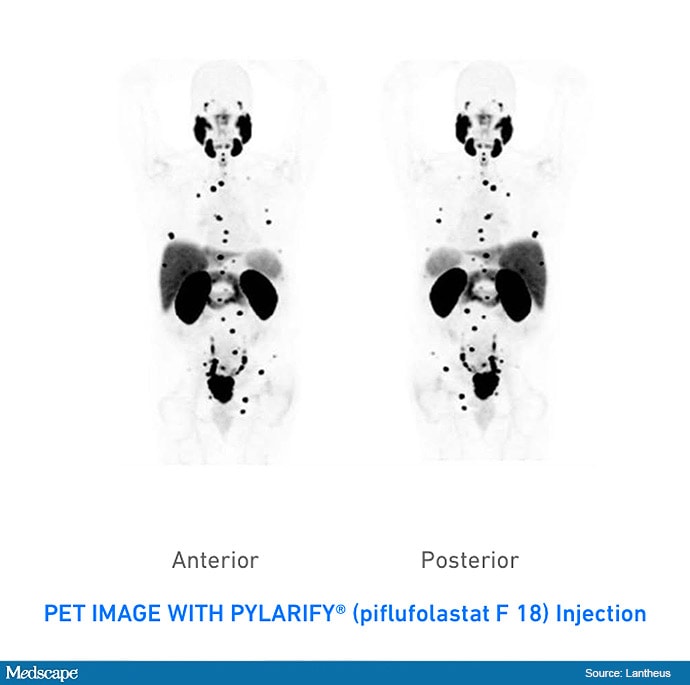A new injectable radioactive diagnostic agent for positron-emission tomography (PET) imaging for men with prostate cancer has been approved by the US Food and Drug Administration (FDA).
The agent, piflufolastat F 18 (PYLARIFY), is a fluorinated small-molecule imaging agent indicated for PET scanning of prostate-specific membrane antigen (PSMA)–positive lesions in patients with suspected metastasis who are candidates for initial definitive therapy and for those with suspected recurrence, as determined on the basis of elevated serum prostate-specific antigen (PSA) level. In the proPSMA trial, published in The Lancet last year, PSMA PET/CT was found to be superior to conventional imaging for primary staging of high-risk prostate cancer.

PSMA PET has been described as a “a real game changer in high-risk prostate cancer and has implications in the various stages of prostate cancer management from diagnosis and staging to theranostics,” Renu Eapen, MBBS, of Peter MacCallum Cancer Center, Melbourne, Australia, commented last year at the annual meeting of the American Urology Association.
First and Only Commercially Available Agent
With this new approval, PYLARIFY becomes the first and only commercially available PSMA PET imaging agent, according to a press release from the drug’s maker, Lantheus Holdings, Inc.
Another PSMA PET imaging agent, Gallium 68 PSMA-11 (Ga68 PSMA-11), was recently granted FDA approval for institutional use, as reported by Medscape Medical News.
However, that approval restricts use of the product to the University of Callifornia, Los Angeles, and the University of California, San Francisco. It was obtained under an academic new drug application after researchers from the institutions reported clinical data in November 2020 at the annual meeting of the American Society for Radiation Oncology.
That agent is available for use only in those specific institutions, whereas the newly approved product is available commercially and can be used by all institutions that have PET scan facilities. PYLARIFY will be available immediately to imaging centers in the parts of the mid-Atlantic and southern United States and to other areas across the country by the end of the year, Lantheus said.
The agent “enables visualization of lymph nodes, bone and soft tissue metastases to determine the presence or absence of recurrent and/or metastatic prostate cancer,” the company notes. “For men with prostate cancer, PYLARIFY PET combines the accuracy of PET imaging, the precision of PSMA targeting and the clarity of an F 18 radioisotope for superior diagnostic performance.”
The approval was based on two company-sponsored pivotal studies: OSPREY and CONDOR.
These studies demonstrated improvement in the specificity and the positive predictive value of PLARIFY PET imaging over conventional imaging in men at risk for metastatic disease prior to initial therapy (OSPREY), and in men with biochemical recurrent prostate cancer (CONDOR). Treatment was well tolerated in both studies. Adverse events were reported by only 2% of patients and included headache, dysgeusia, and fatigue. One patient experienced a delayed hypersensitivity reaction.
The recommended PYLARIFY dose is 333 MBq (9 mCi) administered as a bolus IV injection, but 296–370 MBq (8-10 mCi) is an acceptable range, the company notes.
Sharon Worcester is an award-wining reporter for MDedge News, part of the Medscape Professional Network.
For more from Medscape Oncology, join us on Twitter and Facebook.
Source: Read Full Article